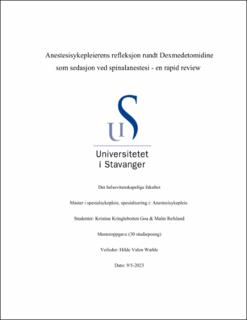Anestesisykepleierens refleksjon rundt Dexmedetomidine som sedasjon ved spinalanestesi - en rapid review
Master thesis
Permanent lenke
https://hdl.handle.net/11250/3079219Utgivelsesdato
2023Metadata
Vis full innførselSamlinger
- Studentoppgaver (HV) [1301]
Sammendrag
Introduksjon: Propofol og Midazolam er ofte førstevalget som sedasjon til pasienter med spinalanestesi. Medikamentene har et smalt terapeutisk vindu, og hemodynamiske og respiratoriske bivirkninger øker derfor i takt med økt dosering. Dexdor er et forholdsvis nytt medikament på markedet, som anses å kunne gi god hemodynamisk og respiratorisk stabilitet.
Hensikt: Å undersøke hvilket medikament anestesisykepleieren kan anvende til sedasjon ved spinalanestesi, for å best bevare en stabil hemodynamikk og respirasjon.
Metode: Det ble utført en rapid review litteraturstudie som tok utgangspunkt i Cochranes metodiske rammeverk for rapid reviews. Litteratursøket ble utført i januar 2023 i databasene Medline, Cochrane Library, Scopus og Google Scholar. Det ble inkludert totalt ni randomiserte kontrollstudier, med til sammen 677 pasienter til elektiv kirurgi med spinalanestesi.
Resultater: Dexdor bevarte blodtrykket bedre enn Propofol og Midazolam, men førte til fall i puls som vedvarte gjennom inngrepet. Dexdor førte til mindre respiratorisk påvirkning enn Propofol. Det ses en sammenheng i hemodynamiske endringer relatert til tidspunkt for innsettelse av spinal og administrering av bolusdose Dexdor, samt ved økende dose Dexdor.
Konklusjon: Dexdor bevarte blodtrykket bedre enn Propofol og Midazolam, men ga flere tilfeller av bradykardi. Grunnet minimal påvirkning av respirasjon, anses Dexdor som trygt å bruke til pasienter med fare for luftveisproblematikk. Anestesisykepleieren må sammen med anestesilege vurdere hver enkelt pasient individuelt med tanke på hvilket medikament som best bevarer hemodynamisk- og respiratorisk stabilitet.
Nøkkelord: Spinalanestesi, hemodynamikk, respirasjon, dexmedetomidine, Propofol, Midazolam. Introduction: Propofol and Midazolam are often the first choice for sedation in patients with spinal anesthesia. The drugs have a narrow therapeutic window, and hemodynamic and respiratory side effect therefore increase with increased dosage. Dexdor is a relatively new drug on the market, which is considered to provide good hemodynamic and respiratory stability.
Aim: To investigate which sedation drug the nurse anesthetist can use that is best suited for sedation in spinal anesthesia, to preserve stable hemodynamics and respiration.
Method: A rapid review literature study was carried out, based on Cochrane's methodological framework for rapid reviews. The literature search was carried out in January 2023 using Medline, Cochrane Library, Scopus and Google Scholas databases. A total of nine randomized control studies were included, with at total of 677 patients undergoing elective surgery with spinal anesthesia.
Results: Dexdor preserved blood pressure better than Propofol and Midazolam yet led to a drop in heart rate that persisted throughout the surgery. Dexdor had less respiratory impact than Propofol. Hemodynamic changes are correlated to the time of insertion of the spinal anesthesia and the administration of Dexdor bolus-dose, as well as with increasing doses of Dexdor.
Conclusion: Dexdor had better impact on blood pressure stability than Propofol and Midazolam but produced more incidence of bradycardia. Dexdor affected the respiration minimally and is considered safe for use in patients with respiratory problems. Together with the anesthetist, the nurse anesthetist must individually assess each patient individually concerning which drug the patient is to be given to remain hemodynamically and respiratory stable.
Keywords: Spinal anesthesia, hemodynamics, respiration, dexmedetomidine, Propofol and Midazolam.
